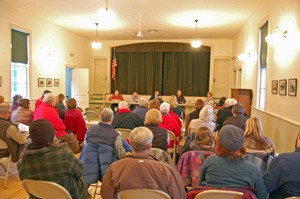Annual Town Meetings Set for Apr. 18
- Share
- Tweet
- Pin
- Share

Annual meetings – which, by Wisconsin statute, are held on the third Tuesday of April – are coming up for Door County’s 14 towns.
That means the towns of Baileys Harbor, Brussels, Clay Banks, Egg Harbor, Forestville, Gardner, Gibraltar, Jacksonport, Liberty Grove, Nasewaupee, Sevastopol, Sturgeon Bay, Union and Washington will all be gathering Tuesday, April 18. (Annual meetings do not apply to villages and cities.)
These meetings are for town electors, and that means anyone who lives within the town and is 18 or older. Individuals do not need to own property or be registered to vote in regular elections in order to be electors.
Unlike cities (such as the City of Sturgeon Bay) and villages (such as the villages of Egg Harbor, Ephraim, Forestville and Sister Bay) that work exclusively on the representative model – voters elect mayors, alders, village presidents and trustees, who then govern for the electors – town governments have components of direct democracy, with electors, or residents, making important decisions directly.
Town supervisors and chairs are also elected and oversee day-to-day governmental operations, but electors have direct powers on certain decisions. Those powers are exercised during the town meeting, where there’s no requirement to have a set agenda. Elector direct powers are discussed or voted on, but people do bring up other things, and if the town chair allows it, those things can be discussed. Any consensus is advisory only.
Perhaps the electors’ greatest powers are the ability to set the town’s tax levy and to authorize the town to exceed the levy limit. This is done in the fall, however, rather than at the annual meeting in the spring.
The direct powers typically exercised at annual meetings include setting the compensation for town offices; deciding whether some town offices should be combined, such as the clerk and treasurer; establishing hourly wages for employees; hiring a town administrator; authorizing the issuance of general obligation bonds; leasing, constructing or purchasing buildings; disposing of property; and engaging in watershed protection or soil- and water-conservation activities.
Some of the powers that town electors have are binding on a town; others are not; and both are spelled out in state statute. Binding powers obligate the town to do what the voters decided. With authorization powers, the town must get elector approval to proceed, but afterward, it does not have to proceed.
This is not an exhaustive list of electors’ powers. For that, head to Section 60.10 in Wisconsin Statutes (at docs.legis.wisconsin.gov/statutes/statutes/60/iii/10) to read about the powers of town meetings.
Although there’s no requirement to have a firm agenda, many towns do set one and have specific topics upon which they want electors to weigh in. To learn what your town’s agenda is, head to your town’s website or check out the legal notices in the Peninsula Pulse.

